Custom Shop: Darkglass Electronics
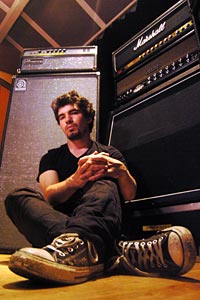 We first heard about Darkglass Electronics by way of the company’s flagship distortion pedal, the Microtubes B3K [check out our review here], and soon met proprietor Douglas Castro. Castro, who hails from Chile but is now based out of Finland, builds all of the pedals by hand.
We first heard about Darkglass Electronics by way of the company’s flagship distortion pedal, the Microtubes B3K [check out our review here], and soon met proprietor Douglas Castro. Castro, who hails from Chile but is now based out of Finland, builds all of the pedals by hand.
A bass player himself, Castro couldn’t get the sound he wanted from all the gear he had available. His imagination and technical skills led him to build his own, which eventually turned into a career. The company has four standard products: the Opressor, the Harmonic Booster, the Microtubes B3K, and the Microtubes B7K.
How did you get into building pedals?
Well, is a long story, but since I can remember, the idea of creating something from scratch was pretty much irresistible. I actually started drawing and painting as a child, then started programming, writing, and after trying pretty much everything you can do while being a kid, I discovered playing bass and fell in love with it. So when high school was over, and I had to chose a career, electronics school made a lot of sense, since I could blend my passions for creating stuff from nothing, and music.
What is the concept behind your designs?
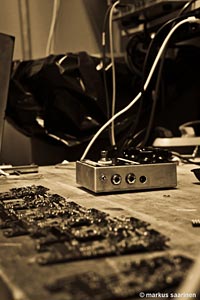 It may sound corny, but I only design, and eventually produce the gear I want to use myself – especially sound-wise and reliability-wise – so I guess achieving exactly the sound I hear in my head, no matter how ambitious it may seem, would the main driving force that leads to a pedal.
It may sound corny, but I only design, and eventually produce the gear I want to use myself – especially sound-wise and reliability-wise – so I guess achieving exactly the sound I hear in my head, no matter how ambitious it may seem, would the main driving force that leads to a pedal.
What led you to designing only bass pedals?
I started designing after a long search for bass distortions. No matter what I tried, no pedal, amp or rack sounded exactly the way I wanted it to. Some came close, but it just wasn’t there yet.
Then some of my customers told me that they had the same problem and asked me whether I could design something totally innovative. So actually that was the beginning of everything.
You were born in Chile, but you moved to Finland. What made you make the move?
Truth be told, it was both for personal and professional reasons, but nonetheless it [fit perfectly] with the vision I had for both myself and Darkglass Electronics. Chile is actually very fertile ground for technology start-ups, but Finland is just more on the radar, I guess. That added to the fact that the music – especially the rock scene here – is amazing, and a bit more developed than in South America. That made it a pretty logical choice. Now don’t get me wrong, I love Chile, but I was mostly curious to see how it’d be to start a business from the ground up somewhere else, and so far it has been challenging, but really rewarding and amazing. I’m glad I did it.
How does your own playing experience affect the way you make your products?
I think that me being a bassist has pretty much everything to do with the way our products are made. Like I mentioned earlier, all our products are the ones that I once wished existed… so is actually all about what we feel is necessary, what we believe the market hasn’t quite accomplished yet to deliver or if I think there’s a good standard, but with room for improvement, we are more than happy to go out there and try to contribute.
What is the most important feature of an effects pedal to you?
It has to sound totally amazing… just the way you want it. Anything less is just not acceptable. Well, for me at least. I think that many have settled for what was available, because well, there was no choice. But now, with new great companies getting started and making extraordinary products, there’s a lot of variety available. Reliability is super important as well, but that perfect sound is compulsory for me.
What is the quintessential bass sound to you?
That’s a tough question. A while ago, I was quite strict and close minded about what I thought was the sound, but after designing, and playing for few years, I have learned to appreciate different characters and styles. I can’t really say what is the “quintessential sound” because there are many ways to make a bass sound great! In the end, it is all a matter of taste… but I guess being more opened about this matter has a big influence on the way I design gear these days. Whereas before, once I achieved the sound I wanted, the features complementing that effect were usually implemented with the idea of retaining that sound in different scenarios, different basses, amps, etc.
Now, is quite the opposite. If you look at the Microtubes B7K for example, it has the same “engine” as its smaller brother, the B3K, but with all the features necessary to make it as flexible as possible. I don’t want to restrict the use and potential of my gear to my taste only, but to allow for the users to construct their own sound taking my concepts and designs as stepping stone. At the end, our only goal is to help bassists sound great, in the exact way they have always wanted to sound.
What’s your take on using “made for guitar” pedals for bass?
Well, I think it depends on what the musician wants to achieve. If a guitar pedal gives you exactly the sound you want, go for it! But if you had to settle for what was available, that’s a whole different matter.
The way I see it, the main issue is that most guitar pedals, especially overdrives, will eat up a lot of the low end. This is mainly because the simplest way to make an overdrive articulated and clear enough, is to filter out the lower harmonic content before the distortion occurs, which is good for getting the right amount of grit and clarity, but at the end is probably not what many bass players might want. That is actually why there are so few bass overdrives in comparison to guitar ones, because designing a circuit that will provide a clear and punchy saturation, while retaining the low end is a huge challenge… I think that many bassists would be surprised with some of the pedals being designed by more recent companies. I certainly encourage everyone to experiment as much as possible, especially since it is easier than ever these days.
Tell us about your process in creating a pedal.
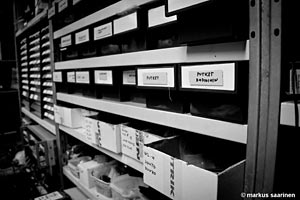 It usually starts with an idea, with a particular vision in matters of a certain sound I’d like to accomplish and the features I would like to add, usually for making the pedal more flexible and versatile.
It usually starts with an idea, with a particular vision in matters of a certain sound I’d like to accomplish and the features I would like to add, usually for making the pedal more flexible and versatile.
But from there, it is a very long process. I usually start by simulating snippets of circuits and then see how can I get what I expect from them. Then I build prototypes with a breadboard and play through them, and then I just keep tweaking and simulating… once certain stages are good enough to continue, I repeat the process.
But the amount of tweaking and simulating is ridiculously high, the fact that it sounds very good is not even near good enough for me. For example, I spent around 18 months going back and forth with the Microtubes B3K, but the circuit was ready after only 6 months. So I had this good sounding pedal basically ready to ship, but didn’t sell even one until it was just the way I wanted it. That may sound obsessive, but well, it’s worked so far.
What is your favorite part about building?
I love designing more than anything, but when it comes to the manufacturing process, I love testing! When you love playing music, there’s something to using something you’ve created that’s pretty unique to me.
How many pedals have you built to date?
Like they say in Silicon Valley: “Isn’t it funny, a ship that leaks from the top?” I’ll just say that surprisingly many for a company just a bit over a half a year old, we are very happy about where we’re at. But we’re still pretty excited with all the potential for growth and the opportunities available.
How do the more recent ones compare with the first?
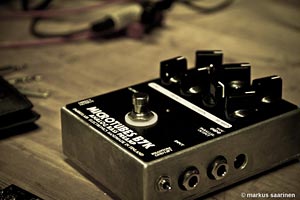 I don’t want to even think about it [laughs]. Well, it all started with a very do-it-yourself spirit. The original plan was to build pedals for myself, then friends liked the way they sounded and started placing the first orders, and through forums, the ideas started to spread and it just developed from there, very organically. The first ones were quite large, since my building and designing skills were not quite developed yet. Although to the best of my knowledge, very few of them have failed.
I don’t want to even think about it [laughs]. Well, it all started with a very do-it-yourself spirit. The original plan was to build pedals for myself, then friends liked the way they sounded and started placing the first orders, and through forums, the ideas started to spread and it just developed from there, very organically. The first ones were quite large, since my building and designing skills were not quite developed yet. Although to the best of my knowledge, very few of them have failed.
After all this years of both building from scratch and repairing, I got a pretty good idea of how pedals should be built to last, and also I developed some cool techniques for mounting large circuits in small enclosures. So I guess that’s the biggest contrast, size and reliability.
Any plans for new products?
Most of it is still in early planning stage, so we don’t want to talk about them just yet. But what I can tell you is that we are currently working on a very cool Fuzz!
What would you tell someone thinking of getting into electronics?
The main advice would be to be stubborn and don’t give up. The first projects are usually very unrewarding, because like anything new, they demand a great deal of energy and focus, and they probably won’t work. So tenacity would be one.
The second is to check the forums. For the first time in history, I think there’s more information available for free than availaable in books or universities. That’s mainly because audio is probably the least scientific branch of engineering, since the main goal is to please subjective needs. So there’s a lot of grey areas, and “black magic” involved. The amount of know how and experience in discussion boards and forums is amazing. That being said, don’t believe everything you hear until you’ve tried it yourself. There is a lot of hype and myths in the audio business!
It’s been very exciting and refreshing to design something totally new, from scratch. A very interesting process, to take a total new approach on designing, for a totally new effect. I am still working on tweaking it, but we are super exited with the way is sounding, and should have prototypes soon, we will let you guys know!

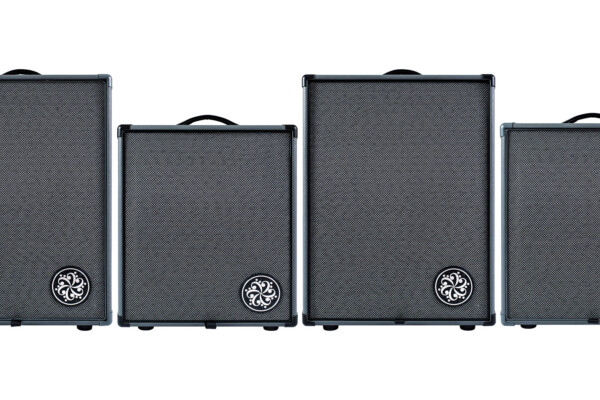
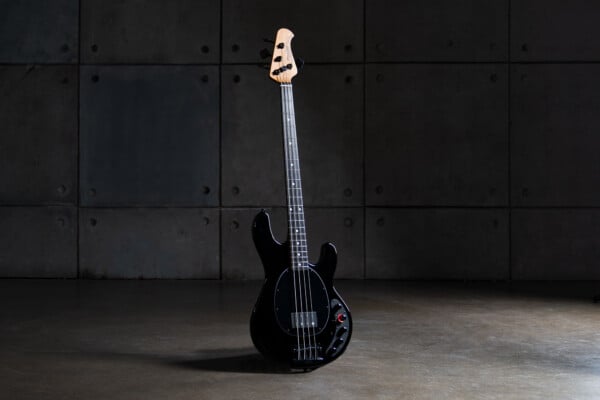
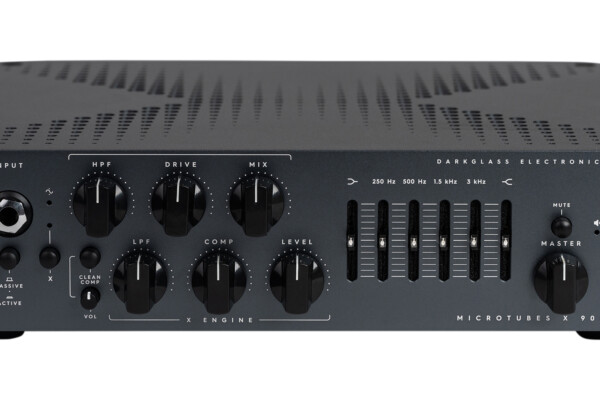
Douglas makes a amazing pedal! I’m loving mine, Very versatile, Sounds great and built to last.
The EQ points work really well, especially other active onboards like my Sadowsky..You’re not doubling up.Highly recommended.